
As a mother of three grade schoolers, Vicky Murillo, 43, sees part-time and short-term jobs as the most convenient way to help her family.
“S’yempre gusto ko ring makatulong sa mga gastusin dito sa bahay, lalo na’t lahat ng mga anak ko ay nag-aaral.,” shared Vicky, a resident of Brgy. Bagumbayan in Teresa, Rizal Province.
Through the years, Vicky has been engaged in various jobs such as being a tutor and enumerator in different census projects.
Although her husband has a stable job as a company driver, she believes venturing into this kind of jobs not only helps her to earn extra but also give her opportunities to interact with various people and learn new things.
In 2015, Vicky applied to be one of the field staff for the Department of Social Welfare and Development’s (DSWD) Listahanan household assessment. She became an enumerator assigned to conduct house to house interviews.
The Listahanan household assessment is a means to gather the socio-economic data of households to determine who and where the poor are nationwide. A targeting system of the DSWD, the Listahanan comes up with a database of the poor that becomes the basis for identifying beneficiaries of programs for the poor and planning for interventions to help improve their living condition.
Vicky was one of the 2,307 field staff who were hired by the DSWD Field Office IV-A in the conduct of the assessment from April to January 2016. They were deployed in different rural and urban areas in the region to assess households.
“Mga tatlong buwan kaming nag-enumerate ng mga tao sa buong Teresa, may pagkakataon ding pinapunta ako sa Tanay para mag-interview. Kumpara sa census ng NSO, mas matagal ito (interview), mas mabusisi. Iniisa-isa talaga para malaman ang kalagayan ng isang pamilya, mula sa hitsura ng bahay, sa dami ng miyembro ng pamilya hanggang sa kung may OFW sa pamilya. Umaabot ako ng mahigit kumulang mga 30 minutes kada bahay,” she shared.
More than the income to support her family, Vicky found it fulfilling that being involved in this job can give opportunities for the poor.
Being provided with opportunities
“Habang nag-iinterview ako ng mga tao at nakikita ko ang kalagayan nila, naiisip ko na lang na mas maswerte pa pala kami kumpara sa kanila dahil mas maayos ang tinitirhan namin. Sana nga mapasama sa Listahanan yung mga pamilyang ininterview ko na talagang mukhang hirap sa buhay,” Vicky added.
Being exposed to different kinds of households made Vicky more thankful for the kind of life she has today and only fueled her desire to help poor families to enjoy a better life.
“Nakakatawa nga kasi naalala ko na may pumunta rin palang taga-DSWD dito sa amin noon, ganun rin, tulad din ng ginagawa naming pag-iinterview. Noong time na ininterview kami, halos katatapos lang ng bagyo, binaha ang mga gamit namin saka nasira yung ibang parte ng bahay namin, mahirap ang sitwasyon namin noon,” she recalled.
In 2009, the first time the DSWD conducted the Listahanan assessment, Vicky’s family became one of 389,811 identified poor households in the CALABARZON Region.
Being identified as poor, for Vicky, gave her opportunities to improve their lives.
Her family became a beneficiary of the Pantawid Pamilyang Pilipino Program, a human capital development program implemented by the DSWD that supports the needs on health, nutrition and education of zero to 18 years old children.
Their family is one of the more than 4.4 million household-beneficiaries of the program nationwide. All of these households were identified through the Listahanan database of the poor in 2009.
Besides the cash grants provided by the program for her three children, Vicky is thankful as to how she learned to improve herself as a beneficiary of the program.
She is a parent leader of Pantawid Pamilya beneficiaries in their barangay. As a parent leader, she assists the Pantawid Pamilya staff assigned in the municipality in monitoring the compliance of co-beneficiaries with their co-responsibilities, filing of grievances, leading in community activities and disseminating important information.
“Hindi madali ang pagiging parent leader, marami kang hinahawakang tao, maraming umaaasa sa’yo na kapwa mo benepisyaryo. Pag my tanong sila, kailangan alam mo ang sagot. Noon, wala akong ideya kung paano maging lider,” she said.
With the help of personality development trainings she attended as part of empowering the capacity of parent leaders, she transforms from being a housewife to a reliable and helpful leader.
“Marami akong natutunan, marami akong nakasalamuhang mga tao na hindi ko na-imagine na makakasalamuha ko, tulad ng mga tao sa DSWD. Feeling ko naging importante akong tao, na-build ang pagkatao ko,” she said.
Further, Vicky became a beneficiary of the Bottom-Up Budgeting in their municipality where she started her own meat-processing business.
“Ngayon, nakakaya na naming suportahan ang aming mga anak. Napapautang ko na rin ang mga produkto kong tocino at tapa sa mga kapwa ko Pantawid beneficiary,” she happily shared.
Being an instrument to help the poor
With all that she went through, Vicky is positive that if people like her are given the right opportunities, improving lives is not impossible.
“Yung pagiging enumerator ko, parang naging pagkakataon ko na rin para makatulong sa DSWD na tumulong sa amin. Naging napakalaking tulong ng Pantawid Pamilya sa aming buhay. Maayos na nakakapag-aral ang tatlo kong anak, ‘pag kailangan nila ng bagong uniporme at gamit, nabibili na namin”, she happily shared.
She has high hopes that with her contribution as an enumerator during the Listahanan 2015 assessment, she’ll be able to provide opportunities to the poor, too.
“Sa pamamagitan ng Listahanan, naniniwala ako na mas maraming mahihirap na tulad namin ang matutulungan at mabibigyan ng pagkakataon, marami pa po ang matutulungan ng DSWD na tunay na mahihirap,” she said.#
